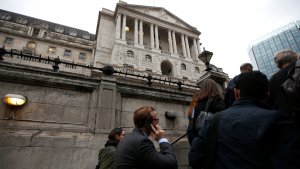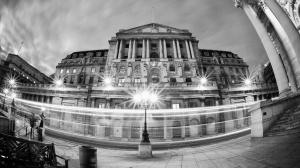The Bank of England is deciding whether to raise interest rates by the most since 1995 next week in order to stop the surge in inflation from becoming a long-term problem for Britain's economy.
Bank Of England Policymakers Torn On Need For Big Rate Move Next Week
The Bank of England is deciding whether to raise interest rates by the most since 1995 next week in order to stop the surge in inflation from becoming a long-term problem for Britain's economy.

The BoE has raised rates five times since December with three of the Monetary Policy Committee's nine members voting for a half percentage-point increase at its last two meetings.
The BoE said in June it was ready to act forcefully if needed and Governor Andrew Bailey has said a half percentage-point increase in interest rates is now on the table, as well as the typical quarter-point move.
Following is a summary of MPC members' recent comments ahead of the MPC's next scheduled announcement on Aug. 4:
MPC MEMBERS WHO VOTED FOR A 25 BASIS-POINT HIKE IN JUNE
ANDREW BAILEY, GOVERNOR
July 19: "A 50 basis-point increase will be among the choices on the table when we next meet. Fifty basis points is not locked in, and anyone who predicts that is doing so based on their own view," Bailey said, adding that the economy was already slowing.
BEN BROADBENT, DEPUTY GOVERNOR
March 30: "As a big net importer of manufactures and commodities, it's doubtful that the UK has ever experienced an external hit to real national income on this scale."
"From the narrow perspective of monetary policy it will result in the near term in the difficult combination of even higher inflation but weaker domestic demand and output growth."
DAVE RAMSDEN, DEPUTY GOVERNOR
July 14: "We will have to respond to whatever happens but we want people to understand that we're not going to let high inflation become sustained and get out of control like it did in the '70s and '80s," Ramsden said.
JON CUNLIFFE, DEPUTY GOVERNOR
July 6: "What we expect is that the cost-of-living squeeze will actually hit people's spending and that will start to cool the economy. We can see signs that the economy is already slowing."
HUW PILL, CHIEF ECONOMIST
July 7: "At least on my part, this statement (by the MPC in June) reflects a willingness - should circumstances require - to adopt a faster pace of tightening than we have seen implemented in this interest rate cycle so far," Pill said.
"The focus of attention will be on indications of more persistent inflationary pressures, which, in my view, places emphasis on potential second-round effects in price- and wage-setting behaviour."
SILVANA TENREYRO, EXTERNAL MPC MEMBER
May 25: "Looking ahead, we do face a very fine balance ... because aggregate demand will be depressed. Workers now will find themselves in a very difficult situation. They will face very stark choices and their real incomes will suffer," she added."
MPC MEMBERS WHO VOTED FOR A 50 BASIS-POINT HIKE
CATHERINE MANN, EXTERNAL MPC MEMBER
July 7: "What the research shows is when there is uncertainty about (the) persistence versus (the) transitory nature of inflation dynamics, it's important to front-load policy," Mann said.
MICHAEL SAUNDERS, EXTERNAL MPC MEMBER
July 18: Financial market forecasts that Bank Rate - currently at 1.25% - would reach or surpass 2% during the next year were not "implausible or unlikely", Saunders said.
"But, rather than focus on a precise forecast for Bank Rate over the next year, the key point is that the tightening cycle may - in my view - still have some way to go," he said.
Saunders is due to leave the MPC after August's meeting.
JONATHAN HASKEL, EXTERNAL MPC MEMBER
Feb. 23: Asked why he voted to raise interest rates by 50 bps in February, Haskel said: "I have to stress it's a very uncertain situation and it's a very, very finely balanced decision."
Haskel said he was "nervous" about a temporary blip in inflation becoming embedded in expectations.
(Compiled by William Schomberg; editing by David Milliken)
Thanks for signing up to Minutehack alerts.
Brilliant editorials heading your way soon.
Okay, Thanks!

